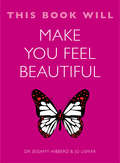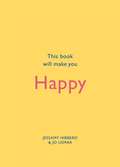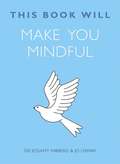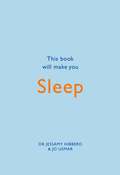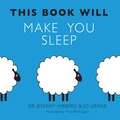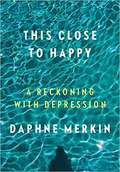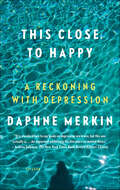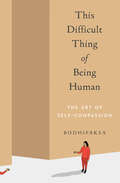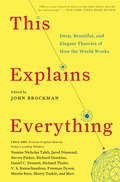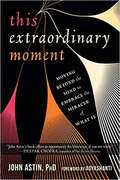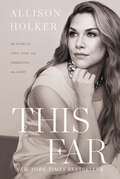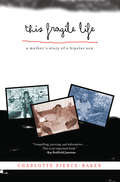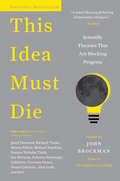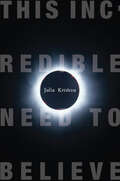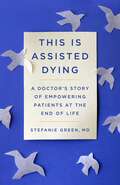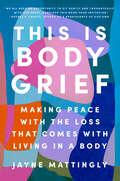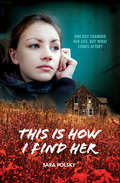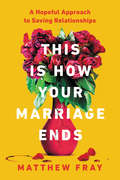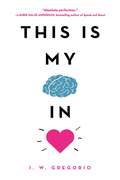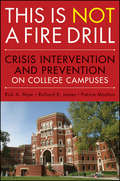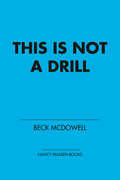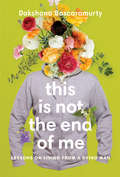- Table View
- List View
This Book Will Make You Feel Beautiful (This Book Will...)
by Jessamy Hibberd Jo UsmarBody image insecurities can affect your entire life. Constantly worrying about how you look can ruin your day-to-day experiences, curb your ambitions and make you feel you don't measure up in some way. If this sounds familiar, it's time to take action. This friendly book addresses the root causes of body image anxiety and breaks them down so you can start changing how you view yourself, your appearance and any difficulties you're facing. You'll learn how to stop destructive behaviours, limit self-criticism, manage emotional eating and see yourself differently. Dr Jessamy Hibberd and Jo Usmar use the latest CBT techniques with practical exercises to enable you to build your self-esteem so you'll feel confident, self-assured and beautiful.Chapters include: Why Do We Hate the Way We Look?Cognitive Behavioural TherapyStopping Bad Body Image BehaviourFood for ThoughtJudgement DayFacing Your Fears
This Book Will Make You Happy
by Jessamy Hibberd Jo UsmarWe all experience periods of feeling low, frustrated and lacking in energy - but ignoring the problem and struggling on can start to affect all areas of your life. Help is at hand: this concise little book shows you how you can reverse negative thoughts and emotions and make yourself happier and more confident. Dr Jessamy Hibberd and Jo Usmar draw on the very latest research in cognitive behavioural therapy (CBT) and modern psychology to give you practical, proven techniques and exercises to combat low mood and, more importantly, increase your happiness, making you healthier and more fulfilled. Chapters include: Positive strategies, Controlling emotions, Rewarding yourself, Combating guilt, Better rest and sleep, Mental exercises, Breaking negative thought patterns, Relaxation techniques.
This Book Will Make You Happy
by Jessamy Hibberd Jo UsmarWe all experience periods of feeling low, frustrated and lacking in energy - but ignoring the problem and struggling on can start to affect all areas of your life. Help is at hand: this concise little book shows you how you can reverse negative thoughts and emotions and make yourself happier and more confident. Dr Jessamy Hibberd and Jo Usmar draw on the very latest research in cognitive behavioural therapy (CBT) and modern psychology to give you practical, proven techniques and exercises to combat low mood and, more importantly, increase your happiness, making you healthier and more fulfilled. Chapters include: Positive strategies, Controlling emotions, Rewarding yourself, Combating guilt, Better rest and sleep, Mental exercises, Breaking negative thought patterns, Relaxation techniques.
This Book Will Make You Mindful
by Jessamy Hibberd Jo UsmarWe live increasingly busy lives, and while some of us have no trouble juggling multiple responsibilities, others struggle to deal with the mounting pressures we feel from external sources, and, most importantly, from ourselves. It's not uncommon to feel buried under the weight of responsibilities and constantly feel like you're running out of time--with days, weeks, and years passing by in a blur. But don't let this discourage you--help is on its way.This compact and accessible volume will arm you with techniques that can help you change your perspective and get the most out of every moment of your life. Dr Jessamy Hibberd and Jo Usmar use the latest mindfulness techniques to teach you how to stop worrying about the future or dwelling on the past and get the most of the life you're living right now. Understanding the way your brain works will help you learn how to cope with the negatives while fully appreciating the good things in life. The result? A happier, more confident, and more productive you!
This Book Will Make You Sleep
by Jessamy Hibberd Jo UsmarBreak negative sleep patterns for better rest and happiness. We all go through patches when we find it hard to sleep. Either we have problems dropping off at night or we wake in the early hours with thoughts buzzing round in our minds. Sometimes it seems impossible to get that elusive night's sleep we so badly crave, but this book will show you how to break negative patterns, get more rest and improve your wellbeing. Dr Jessamy Hibberd and Jo Usmar draw on the very latest developments in cognitive behavioural therapy (CBT) and popular psychology, to guide you through proven techniques to help you get your sleep patterns back on track. You will feel rested, happier, and immediately reap the benefits in your everyday life.Praise for the This Book Will series:'Top tips for making your life loads better.' Cosmo'The answer to all my problems.' Katie Piper'Take on January with new-found serenity with this series of self-help books' Stylist
This Book Will Make You Sleep
by Jessamy Hibberd Jo UsmarBreak negative sleep patterns for better rest and happiness.We all go through patches when we find it hard to sleep. Either we have problems dropping off at night or we wake in the early hours with thoughts buzzing round in our minds. Sometimes it seems impossible to get that elusive night's sleep we so badly crave, but this book will show you how to break negative patterns, get more rest and improve your wellbeing. Dr Jessamy Hibberd and Jo Usmar draw on the very latest developments in cognitive behavioural therapy (CBT) and popular psychology, to guide you through proven techniques to help you get your sleep patterns back on track. You will feel rested, happier, and immediately reap the benefits in your everyday life.Praise for the This Book Will series:'Top tips for making your life loads better.' Cosmo'The answer to all my problems.' Katie Piper'Take on January with new-found serenity with this series of self-help books' Stylist
This Book Will Make You Sleep
by Jessamy Hibberd Jo UsmarWe all go through patches when we find it hard to sleep. Either we have problems dropping off at night or we wake in the early hours with thoughts buzzing round in our minds. Sometimes it seems impossible to get that elusive night's sleep we so badly crave, but this book will show you how to break negative patterns, get more rest and improve your wellbeing. Dr Jessamy Hibberd and Jo Usmar draw on the very latest developments in cognitive behavioural therapy (CBT), to guide you through proven techniques to help you get your sleep patterns back on track. You will feel rested, happier, and immediately reap the benefits in your everyday life.(P)2014 WF Howes Ltd
This Close to Happy: A Reckoning with Depression
by Daphne Merkin<p>“Despair is always described as dull,” writes Daphne Merkin, “when the truth is that despair has a light all its own, a lunar glow, the color of mottled silver.” This Close to Happy—Merkin’s rare, vividly personal account of what it feels like to suffer from clinical depression—captures this strange light. <p>Daphne Merkin has been hospitalized three times: first, in grade school, for childhood depression; years later, after her daughter was born, for severe postpartum depression; and later still, after her mother died, for obsessive suicidal thinking. Recounting this series of hospitalizations, as well as her visits to myriad therapists and psychopharmacologists, Merkin fearlessly offers what the child psychiatrist Harold Koplewicz calls “the inside view of navigating a chronic psychiatric illness to a realistic outcome.” The arc of Merkin’s affliction is lifelong, beginning in a childhood largely bereft of love and stretching into the present, where Merkin lives a high-functioning life and her depression is manageable, if not “cured.” “The opposite of depression,” she writes with characteristic insight, “is not a state of unimaginable happiness . . . but a state of relative all-right-ness.” <p>In this dark yet vital memoir, Merkin describes not only the harrowing sorrow that she has known all her life, but also her early, redemptive love of reading and gradual emergence as a writer. Written with an acute understanding of the ways in which her condition has evolved as well as affected those around her, This Close to Happy is an utterly candid coming-to-terms with an illness that many share but few talk about, one that remains shrouded in stigma. In the words of the distinguished psychologist Carol Gilligan, “It brings a stunningly perceptive voice into the forefront of the conversation about depression, one that is both reassuring and revelatory.”</p>
This Close to Happy: A Reckoning with Depression
by Daphne Merkin&“A cleareyed, insightful account of how she felt during her nosedives into despair . . . shot through with a self-awareness that helps readers cheer her on.&”—The New York Times A New York Times Book Review Favorite Read of the Year &“Despair is always described as dull,&” writes Daphne Merkin, &“when the truth is that despair has a light all its own, a lunar glow, the color of mottled silver.&” This Close to Happy—Merkin&’s rare, vividly personal account of what it feels like to suffer from clinical depression—captures this strange light. Merkin has been hospitalized three times: first, in grade school, for childhood depression; years later, after her daughter was born, for severe postpartum depression; and later still, after her mother died, for obsessive suicidal thinking. Recounting this series of hospitalizations, as well as her visits to myriad therapists and psychopharmacologists, Merkin portrays the lifelong arc of her affliction, beginning in a childhood largely bereft of love and stretching into the present, where she lives a high-functioning life and her depression is manageable, if not &“cured.&” The opposite of depression, she writes with characteristic insight, is not a state of unimaginable happiness, but a state of relative all-right-ness. In this dark yet vital memoir, Merkin describes not only the harrowing sorrow that she has known all her life, but also her early, redemptive love of reading and gradual emergence as a writer. Written with an acute understanding of the ways in which her condition has evolved as well as affected those around her, This Close to Happy is an utterly candid coming-to-terms with an illness that is still often stigmatized and shrouded in misunderstanding. &“[A] mesmerizing memoir.&” —Booklist (starred review) &“Brings a stunningly perceptive voice to the forefront of the conversation about depression, one that is both reassuring and revelatory.&” —Carol Gilligan, author of In a Different Voice
This Difficult Thing of Being Human: The Art of Self-Compassion
by BodhipaksaWe all long for someone to offer us unconditional love and support. But what if that person is us? The practice of mindful self-compassion creates the space we need so that observation, acceptance, and real love can enter, no matter how judgmental or disconnected we may feel.It sounds like a simple idea: to be kind to yourself. But if you pay attention to your thoughts, habits, and self-talk, you may find that it's more difficult than it sounds. The intentional practice of self-compassion, outlined here by Buddhist scholar and teacher Bodhipaksa, can help you find greater overall wellbeing, emotional resilience, physical health, and willpower. Bodhipaksa provides both the why and the how of mindful self-compassion, drawing on contemporary psychology and neuroscience and also on Buddhist psychology, weaving the modern and ancient together into a coherent whole.Contemporary psychologists are focusing less on self-esteem and more on self-compassion. Bodhipaksa, a practicing meditator of more than thirty years, effortlessly blends ancient techniques dating back to the time of the Buddha with the most recent understanding of psychology and neuroscience. And in the end, as Bodhipaksa writes, it is actually quite simple: "Life is short. Be kind."
This Explains Everything: 150 Deep, Beautiful, and Elegant Theories of How the World Works (Edge Question Series)
by John BrockmanDrawn from the cutting-edge frontiers of science, This Explains Everything will revolutionize your understanding of the world.What is your favorite deep, elegant, or beautiful explanation? This is the question John Brockman, publisher of Edge.org ("The world's smartest website"--The Guardian), posed to the world's most influential minds. Flowing from the horizons of physics, economics, psychology, neuroscience, and more, This Explains Everything presents 150 of the most surprising and brilliant theories of the way of our minds, societies, and universe work.Jared Diamond on biological electricity * Nassim Nicholas Taleb on positive stress * Steven Pinker on the deep genetic roots of human conflict * Richard Dawkins on pattern recognition * Nobel Prize-winning physicist Frank Wilczek on simplicity * Lisa Randall on the Higgs mechanism * BRIAN Eno on the limits of intuition * Richard Thaler on the power of commitment * V. S. Ramachandran on the "neural code" of consciousness * Nobel Prize winner ERIC KANDEL on the power of psychotherapy * Mihaly Csikszentmihalyi on "Lord Acton's Dictum" * Lawrence M. Krauss on the unification of electricity and magnetism * plus contributions by Martin J. Rees * Kevin Kelly * Clay Shirky * Daniel C. Dennett * Sherry Turkle * Philip Zimbardo * Lee Smolin * Rebecca Newberger Goldstein * Seth Lloyd * Stewart Brand * George Dyson * Matt Ridley
This Extraordinary Moment: Moving Beyond the Mind to Embrace the Miracle of What Is
by John Astin AdyashantiAnyone who attempts to describe what is ultimately indescribable faces the same challenge—how does one use words to explain something that transcends language? Many writers fall into the trap of using more words to do the job that most words aren’t even particularly suited for, the ideas growing ever more allusive and abstract as the verbiage piles up. But in trying to unmoor the essence of lived experience from the concepts and stories we use to construct it, author and spiritual teacher John Astin takes a different approach—using fewer words instead of more, and grounding them with exercises designed to evoke the actual experience of what he’s describing. <p><p> Evoking the true nature of experience in words is a tricky proposition: perceptual reality has no beginning and no end, making it impossible to delineate, and what arises internally as thoughts and feelings are equally limitless, indeterminate, and unresolvable. While we have countless ways to categorize, conceptualize, and label things, the truth of whatever is being felt, seen, tasted, touched, or heard is infinitely more complex and multidimensional than our conceptual or linguistic structures would have us believe. By becoming more intimate with experience itself—rather than trying to narrate, avoid, or escape it—we can begin to discover that our experiences cannot possibly limit us in the ways we’ve imagined, owing to their radically open-ended and ultimately indefinable nature. <p><p> This Extraordinary Moment invites you on a journey of boundless inquiry, which becomes a liberating free-fall into the mysteries that lie just beyond our understanding of lived reality—which words can never quite describe. Built entirely around personal experience and exploration, this book provides activities, dialogues, exercises, and meditations to help you unlearn the basic misapprehensions about the nature of moment-to-moment experience, and shows you how to gain distance from the stories you tell about what you’re experiencing, so as to better focus on what’s actually happening in the present moment. <p><p> With ultrashort chapters grounded in experiential practices, and without the use of the usual spiritual jargon, this fast-moving, highly readable book makes the esoteric accessible to all—from anyone interested in stress management, well-being, or positive psychology to the devoted spiritual seeker.
This Far: My Story of Love, Loss, and Embracing the Light
by Allison HolkerNEW YORK TIMES BESTSELLER&“A celebration of the healing power of family and dance, Holker&’s memoir shows how to heal from tragedy without wrapping everything up in a neat bow.&” – Library JournalIn this candid and emotional memoir, Allison Holker opens up about her incredible dance career, her relationship with Stephen &“tWitch&” Boss, and the resilience that has carried her forward after his death.Allison Holker was just eighteen when she found fame as a contestant on the reality TV show So You Think You Can Dance. Over the next several years, she had her first child, built a successful career as a professional dancer despite the industry being hostile to working moms, and fell in love with and married fellow dancer Stephen Boss, the former hype man and DJ of The Ellen DeGeneres Show known for his charisma and relentless positivity. Two more children and a wealth of professional opportunities for both Allison and Stephen followed, and the Bosses appeared to be one of the great Hollywood love stories.Then, in December 2022, Stephen took his own life, leaving Allison to wrestle with unanswered questions, haunting what-ifs, and the heartbreaking realization that Stephen&’s infectious joy was hiding pain, addictions, and self-doubt deeper than anyone knew.For the first time, Allison reveals how she has navigated the emotional and financial aftermath of Stephen&’s choice, guided their three children in their grief while managing the outpouring from a well-meaning public, and reopened herself to the next chapter in her professional and personal life. A beacon of hope and comfort for anyone experiencing grief—especially unexpected loss due to suicide—Allison&’s story is an honest reflection on the pain of looking back on a complicated life and the resilience required to move into the future.
This Fragile Life: A Mother's Story of a Bipolar Son
by Charlotte Pierce-Baker"Illuminating and brilliant, with poetry and prose, mother and son lay bare the ravages of bipolar disorder and the journey toward growth and understanding. A touching, lyrical memoir." --Jewell Parker Rhodes, award-winning author, Voodoo Dreams and Douglass' Women Told in a mother's own words, this is a moving story of a loving African American family that faces the daily crisis of an unpredictable mental disorder. Charlotte Pierce-Baker and her husband did everything right when raising their son Mark: providing emotional support, the best education possible, and the freedom to choose his own path. At age 25, Mark was pursuing a postgraduate degree in film, living with his fiancée, and seemingly in control of his life, so Pierce-Baker never imagined her high-achieving son would wind up handcuffed, barely clothed, dirty, mad, and in jail. Mark's bipolar disorder manifested late and included hospitalizations, calls in the night, pleas for money, jail, lawyers, prescriptions, doctors, alcohol and drug relapses, and continuous disputes about how to live--and not live. This autobiography weaves a fascinating story of mental illness, race, family, the drive of African Americans to succeed, and a mother's love for her son. Charlotte Pierce-Baker is a professor of women's studies, gender studies, and English at Vanderbilt University and the author of Surviving the Silence. She lives in Nashville, Tennessee.
This Idea Must Die: Scientific Theories That Are Blocking Progress (Edge Question Series)
by John BrockmanReporting from the cutting edge of scientific discovery, today's visionary thinkers target the greatest roadblocks to innovation.Few truly new ideas are developed without first abandoning old ones. In the past, discoveries often had to wait for the rise of the next generation to see questions in a new light and let go of old truisms. Today, in a world that is defined by a rapid rate of change, staying on the cutting edge has as much to do with shedding outdated notions as adopting new ones. In this spirit, John Brockman, publisher of the online salon Edge.org ("the world's smartest website"--The Guardian), asked 175 of the world's most influential scientists, economists, artists, and philosophers: What scientific idea is ready for retirement?Jared Diamond explores the diverse ways that new ideas emerge * Nassim Nicholas Taleb takes down the standard deviation * Richard Thaler and novelist Ian McEwan reveal the usefulness of "bad" ideas * Steven Pinker dismantles the working theory of human behavior * Richard Dawkins renounces essentialism * Sherry Turkle reevaluates our expectations of artificial intelligence * Physicist Andrei Linde suggests that our universe and its laws may not be as unique as we think * Martin Rees explains why scientific understanding is a limitless goal * Alan Guth rethinks the origins of the universe * Sam Harris argues that our definition of science is too narrow * Nobel Prize winner Frank Wilczek disputes the division between mind and matter * Lawrence Krauss challenges the notion that the laws of physics were preordained * plus contributions from Daniel Goleman, Mihaly Csikszentmihalyi, Nicholas Carr, Rebecca Newberger Goldstein, Matt Ridley, Stewart Brand, Sean Carroll, Daniel C. Dennett, Helen Fisher, Douglas Rushkoff, Lee Smolin, Kevin Kelly, Freeman Dyson, and others.
This Incredible Need to Believe (European Perspectives)
by Julia Kristeva&“A sprawling analysis of religion in major psychological and philosophical literature, fiction and in private life . . . compelling and remarkable.&”—Publishers Weekly &“Unlike Freud, I do not claim that religion is just an illusion and a source of neurosis. The time has come to recognize, without being afraid of &‘frightening&’ either the faithful or the agnostics, that the history of Christianity prepared the world for humanism.&” So writes Julia Kristeva in this provocative work, which skillfully upends our entrenched ideas about religion, belief, and the thought and work of a renowned psychoanalyst and critic. With dialogue and essay, Kristeva analyzes our &“incredible need to believe&”—the inexorable push toward faith that, for Kristeva, lies at the heart of the psyche and the history of society. Examining the lives, theories, and convictions of Saint Teresa of Avila, Sigmund Freud, Donald Winnicott, Hannah Arendt, and other individuals, she investigates the intersection between the desire for God and the shadowy zone in which belief resides. Kristeva suggests that human beings are formed by their need to believe, beginning with our first attempts at speech and following through to our adolescent search for identity and meaning. Kristeva then applies her insight to contemporary religious clashes and the plight of immigrant populations. Even if we no longer have faith in God, Kristeva argues, we must believe in human destiny and creative possibility. Reclaiming Christianity&’s openness to self-questioning and the search for knowledge, Kristeva urges a &“new kind of politics,&” one that restores the integrity of the human community. &“A helpful commentary and introduction to Kristeva&’s major work over the last two decades.&”—Choice
This Incredible Need to Believe (European Perspectives: A Series in Social Thought and Cultural Criticism)
by Julia Kristeva"Unlike Freud, I do not claim that religion is just an illusion and a source of neurosis. The time has come to recognize, without being afraid of 'frightening' either the faithful or the agnostics, that the history of Christianity prepared the world for humanism."So writes Julia Kristeva in this provocative work, which skillfully upends our entrenched ideas about religion, belief, and the thought and work of a renowned psychoanalyst and critic. With dialogue and essay, Kristeva analyzes our "incredible need to believe"--the inexorable push toward faith that, for Kristeva, lies at the heart of the psyche and the history of society. Examining the lives, theories, and convictions of Saint Teresa of Avila, Sigmund Freud, Donald Winnicott, Hannah Arendt, and other individuals, she investigates the intersection between the desire for God and the shadowy zone in which belief resides. Kristeva suggests that human beings are formed by their need to believe, beginning with our first attempts at speech and following through to our adolescent search for identity and meaning. Kristeva then applies her insight to contemporary religious clashes and the plight of immigrant populations, especially those of Islamic origin. Even if we no longer have faith in God, Kristeva argues, we must believe in human destiny and creative possibility. Reclaiming Christianity's openness to self-questioning and the search for knowledge, Kristeva urges a "new kind of politics," one that restores the integrity of the human community.
This Is Assisted Dying: A Doctor's Story of Empowering Patients at the End of Life
by Stefanie GreenA transformative and compassionate memoir by a leading pioneer in medically assisted dying who began her career in the maternity ward and now helps patients who are suffering explore and then fulfill their end of life choices.Dr. Stefanie Green has been forging new paths in the field of medical assistance in dying since 2016. In her landmark memoir, Dr. Green reveals the reasons a patient might seek an assisted death, how the process works, what the event itself can look like, the reactions of those involved, and what it feels like to oversee proceedings and administer medications that hasten death. She describes the extraordinary people she meets and the unusual circumstances she encounters as she navigates the intricacy, intensity, and utter humanity of these powerful interactions. Deeply authentic and powerfully emotional, This Is Assisted Dying contextualizes the myriad personal, professional, and practical issues surrounding assisted dying by bringing readers into the room with Dr. Green, sharing the voices of her patients, her colleagues, and her own narrative. As our population confronts issues of wellness, integrity, agency and community, and how to live a connected, meaningful life, this progressive and compassionate book by a physician at the forefront of medically assisted dying offers comfort and potential relief. This Is Assisted Dying will change the way people think about their choices at the end of life, and show that assisted dying is less about death than about how we wish to live.
This Is Body Grief: Making Peace with the Loss That Comes with Living in a Body
by Jayne Mattingly"We all need an opportunity to sit gently and thoughtfully with our grief. Consider this book your invitation."—Rachel Cargle, author of A Renaissance of Her OwnA guide to living and making peace with your ever-changing bodyHave you ever felt like your body has failed you? Maybe you&’re not as quick or as strong as you used to be, or an illness has wrecked your sense of self, or no matter what diet you follow, you still feel uncomfortable in your own skin. So you go to war with your body for what it can no longer do—when the truth is, our bodies are always on our side.In This Is Body Grief, disability advocate and recovery expert Jayne Mattingly lays out a groundbreaking approach to mourning and accepting one&’s ever-changing body. Like all grief, she says, Body Grief cannot be overcome but felt in all its complexity. Dismantling the narrative that your body is &“against you,&” she presents new ways to cope with your body's fluctuating abilities with self-compassion and grace. Along the way, she walks you through the seven stages of Body Grief—from dismissal, shock, and self-blame to hopelessness and hope, and eventual body trust—offering wisdom for how to make space for each difficult emotion as it arises.Sharing stories from everyday people in the throes of Body Grief as well as her own journey as a newly-disabled woman—from the first of many harrowing hospital visits that resulted in her own life-altering diagnosis, to having to use a rollator on her wedding day because she could no longer walk safely on her own, to accepting the need for a hysterectomy in her early 30s—Mattingly shows that although healing isn&’t a linear journey, it begins when we trust and work in tandem with our bodies.
This Is How I Find Her
by Sara PolskySophie has always lived her life in the shadow of her mother's bipolar disorder: monitoring medication, making sure the rent is paid, rushing home after school instead of spending time with friends, and keeping secrets from everyone.But when a suicide attempt lands Sophie's mother in the hospital, Sophie no longer has to watch over her. She moves in with her aunt, uncle, and cousin--a family she's been estranged from for the past five years. Rolling her suitcase across town to her family's house is easy. What's harder is figuring out how to rebuild her life.And as her mother's release approaches and the old obligations loom, Sophie finds herself torn between her responsibilities toward her mother and her desire to live her own life. Sophie must decide what to do next.
This Is How Your Marriage Ends: A Hopeful Approach to Saving Relationships
by Matthew FrayA thoughtful, down-to-earth, contemporary guide to help partners identify and address relationship-killing behavior patterns in their own lives.Good people can be bad at relationships. One night during his divorce, after one too many vodkas and a call with a phone-in-therapist who told him to “journal his feelings,” Matthew Fray started a blog. He needed to figure out how his ex-wife went from the eighteen-year-old college freshman who adored him to the angry woman who thought he was an asshole and left him. As he pieced together the story of his marriage and its end, Matthew began to realize a hard truth: even though he was a decent guy, he was a bad husband. As he shared raw, uncomfortable, and darkly humorous first-person stories about the lessons he’d learned from his failed marriage, a peculiar thing happened. Matthew started to gain a following. In January 2016 a post he wrote—“She Divorced Me Because I left the Dishes by the Sink”—went viral and was read over four million times.Filtered through the lens of his own surprising, life-changing experience and his years counseling couples, This Is How Your Marriage Ends exposes the root problem of so many relationships that go wrong. We simply haven’t been taught any of the necessary skills, Matthew explains. In fact, it is sometimes the assumption that we are acting on good intentions that causes us to alienate our partners and foment mistrust.With the humorous, entertaining, and counterintuitive approach of The Subtle Art of Not Giving a F*ck, and the practical insights of The 5 Love Languages, This is How Your Marriage Ends helps readers identify relationship-killing behavior patterns in their own lives, and offers solutions to break free from the cycles of dysfunction and destruction. It is must-read for every partner no matter what stage–beginning, middle, or even end—of your relationship.
This Is My Brain in Love
by I. W. GregorioTold in dual narrative, This Is My Brain in Love is a stunning YA contemporary romance, exploring mental health, race and, ultimately, self-acceptance, for fans of I Am Not Your Perfect Mexican Daughter and Emergency Contact. p.p1 {margin: 0.0px 0.0px 12.0px 0.0px; line-height: 14.0px; font: 13.0px Times; color: #000000; -webkit-text-stroke: #000000} span.s1 {font-kerning: none} Jocelyn Wu has just three wishes for her junior year: To make it through without dying of boredom, to direct a short film with her BFF Priya Venkatram, and to get at least two months into the year without being compared to or confused with Peggy Chang, the only other Chinese girl in her grade.Will Domenici has two goals: to find a paying summer internship, and to prove he has what it takes to become an editor on his school paper. Then Jocelyn's father tells her their family restaurant may be going under, and all wishes are off. Because her dad has the marketing skills of a dumpling, it's up to Jocelyn and her unlikely new employee, Will, to bring A-Plus Chinese Garden into the 21st century (or, at least, to Facebook).What starts off as a rocky partnership soon grows into something more. But family prejudices and the uncertain future of A-Plus threaten to keep Will and Jocelyn apart. It will take everything they have and more, to save the family restaurant and their budding romance.
This Is NOT a Fire Drill
by Rick A. Myer Richard K. James Patrice MoultonPractical Information and Tools to Create and Implement a Comprehensive College Campus Crisis Management Program Written by three seasoned crisis intervention/prevention specialists with over fifty years combined experience in the field, This is NOT a Fire Drill: Crisis Intervention and Prevention on College Campuses is a practical guide to creating a comprehensive college campus crisis management program. Authors Rick Myer, Richard James, and Patrice Moulton provide university administrators, faculty, and staff with invaluable hands-on examples, general tactics, and strategies along with specific prevention, intervention, and post-crisis logistics and techniques that can be applied to almost any crisis likely to be confronted on a college campus. This is NOT a Fire Drill features a host of helpful resources, including: A proven individual/organization assessment tool to ensure school professionals and staff take appropriate action to protect students, the college, and the community Thought-provoking case examples, activities, and illustrative dialogues that provide opportunities for reflection and practice A checklist to get a crisis prevention and intervention plan for human dilemmas up and running A decision-tree model to guide the response and recovery to crisis This is NOT a Fire Drill provides the necessary tools to address the emotional, cognitive, and behavioral responses of students and staff as they attempt to negotiate a crisis and its aftermath.
This Is Not a Drill
by Beck McdowellTwo teens try to save a class of first-graders from a gun-wielding soldier suffering from PTSD When high school seniors Emery and Jake are taken hostage in the classroom where they tutor, they must work together to calm both the terrified children and the gunman threatening them--a task made even more difficult by their recent break-up. Brian Stutts, a soldier suffering from post-traumatic stress disorder after serving in Iraq, uses deadly force when he's denied access to his son because of a custody battle. The children's fate is in the hands of the two teens, each recovering from great loss, who now must reestablish trust in a relationship damaged by betrayal. Told through Emery and Jake's alternating viewpoints, this gripping novel features characters teens will identify with and explores the often-hidden damages of war.
This Is Not the End of Me: Lessons on Living from a Dying Man
by Dakshana BascaramurtyFor readers of Paul Kalanithi's When Breath Becomes Air and Will Schwalbe, the moving, inspiring story of a young husband and father who, when diagnosed with terminal cancer at the age of thirty-three, sets out to build a legacy for his infant son. i can't make you feel what it's like to be a young, dumb, naïve thirty-year-old sitting in the back of a walk-in clinic waiting to be handed what is essentially a death sentence any more than i can show you what it feels like to have a husband or father or child who's dying and knowing there is nothing you can do to stop it. i can only describe to you how i feel today. angry. at peace. scared. grateful. a giant, spiky, flowering heart-shaped bouquet of contradictions. Layton Reid was a globe-trotting, risk-taking, sunshine-addicted bachelor--then came a melanoma diagnosis. Cancer startled him out of his arrested development--he returned home to Halifax to work as a wedding photographer--and remission launched him into a new, passionate life as a husband and father-to-be. When the melanoma returned, now at Stage IV, Layton and his family put all their stock into a punishing alternative therapy, hoping for a cure. This Is Not the End of Me recounts Layton's three-year journey as he tried desperately to stay alive for his young son, Finn, and then found purpose in preparing Finn for a world without him. With incredible intimacy, grit, and empathy, reporter Dakshana Bascaramurty casts an unsentimental eye on who her good friend was: his effervescence, his twisted wit, his anger, his vulnerability. Interweaving Layton's own reflections--his diaries written for Finn, his letters to his wife, Candace, and his public journal--she paints a keenly observed portrait of Layton's remarkable evolution. In detailing the ugly, surprising, and occasionally funny ways in which Layton and his family faced his mortality, the book offers an unflinching look at how a person dies, and how we might build a legacy in our information-saturated age. Powerful and unvarnished, This is Not the End of Me is about someone who didn't get a very happy ending, but learned to squeeze as much life as possible from his final days.
